Ep. 116: Daredevil: Born Again, by Miller & Mazzucchelli
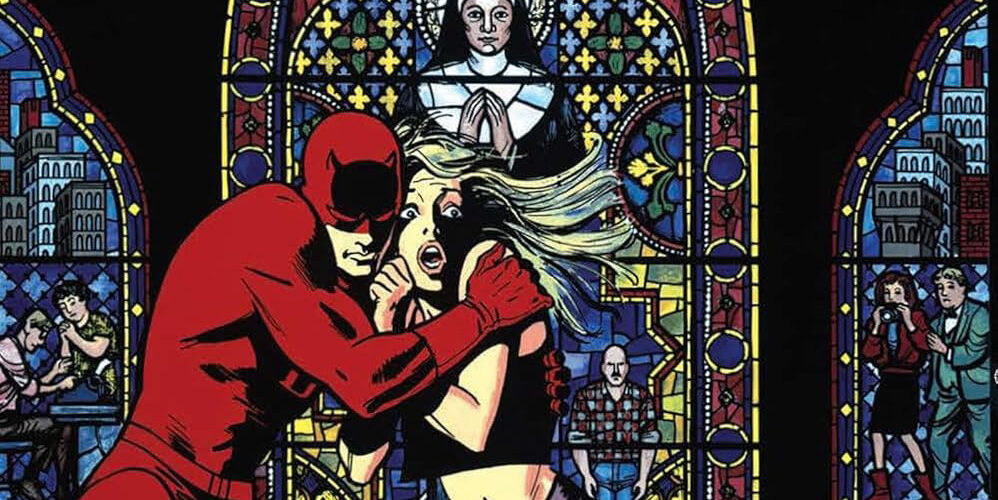
Welcome to our very first episode of… Comicsplaining?! That’s right, this week we’re covering a “mainstream, superhero” book, Daredevil: Born Again by Frank Miller and David Mazzuchelli. Chip calls it his “Nausicaa,” and everything THAT means. But wait, why are covering a non-manga title? What does this have to do with Mangasplaining? Does Chip nerd out on Daredevil: Born Again SUPER HARD for this entire Episode? Listen on, fans, and find out!
Powered by RedCircle
Listen and Subscribe to the Podcast:
Youtube | Apple | Stitcher | RedCircle | Amazon | Radio Public | PocketCast | Spotify
Also check out our digital manga publishing endeavors and newsletter at MangasplainingExtra.com.
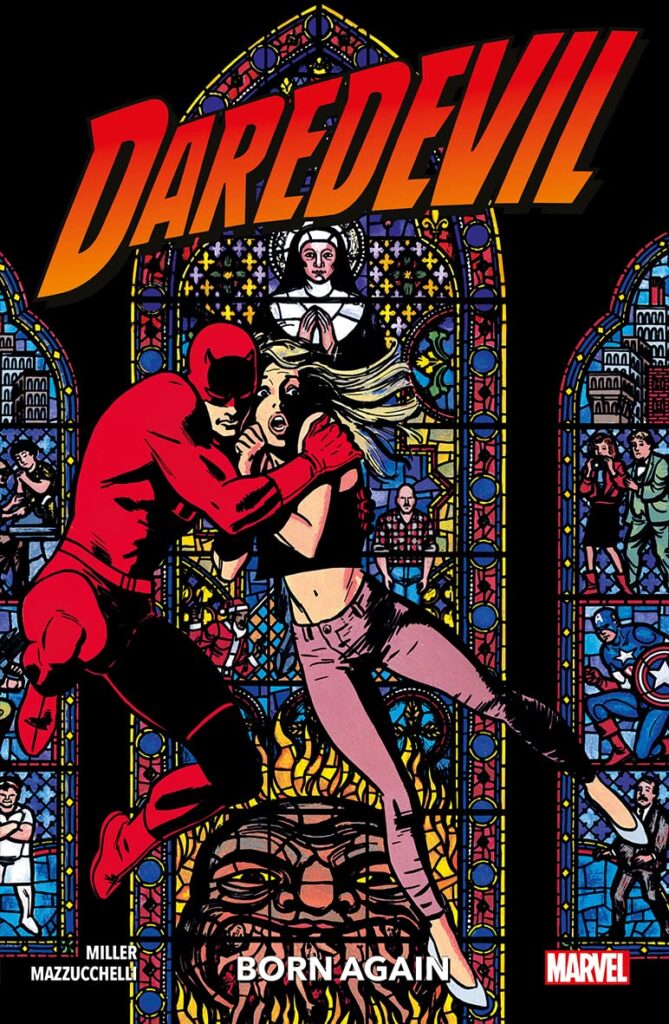
Daredevil: Born Again
Written by Frank Miller
Art by David Mazzucchelli (with Dennis Janke)
Colored by Christie Scheele and Richmond Lewis
Lettered by Joe Rosen
Edited by Ralph Macchio
Published by Marvel Comics (Print/Digital)
Audio editing by David Brothers. Show notes by Christopher Woodrow-Butcher and Deb Aoki
ABOUT DAREDEVIL: BORN AGAIN
Marvel Comics describes Daredevil: Born Again thusly:
Visionary geniuses Frank Miller (The Dark Knight Returns, Sin City) and David Mazzucchelli (Batman: Year One) bring you this classic Daredevil story that redefined the character and created a new benchmark in graphic storytelling.
The book that inspired Daredevil’s portrayal in the Marvel Cinematic Universe. Daredevil: Born Again premieres March 2025 on Disney+.
From the powerhouse pairing of Frank Miller and David Mazzucchelli comes the definitive Daredevil tale. Karen Page, Matt Murdock’s former lover, sets into motion a Machiavellian chain of events by trading away his secret identity for a drug fix. Now, Daredevil must find all the strength he can muster as Wilson Fisk, the Kingpin of Crime, wastes no time taking him down as low as a human can get. As he’s nursed back to health by a nun named Sister Maggie, Matt discovers a shocking secret that will change their relationship forever — but can he piece his life back together and survive a battle against the brutal super-soldier named Nuke?
Collects Daredevil #226-233
Before We Get Started
Hi all, Christopher here again. What a year it’s been! This episode was recorded back in February, and we just squeaked it out in October, 2024. Show notes coming your way in December, I’m playing Christmas music in the background. Did you know that there’s a Lo-fi Christmas station on Youtube Music? Anyway. It’s been a pretty challenging year for me personally, honestly, with the unfortunate loss of a number of people very close to me. It threw things into disarray, especially trying to juggle all of my work responsibilities alongside of this incredible project, Mangasplaining. I know everyone else on the team has had their challenges too, and you know, we’re human and life is life. I don’t really talk about it a lot online but, hug your loved ones and let them know you love them. But hopefully, HOPEFULLY, this is back to normal.
That out of the way, this episode actually came about from a conversation some time last season, where Deb was talking about her unfamiliarity with American superhero comics. She said that she read a few back in the day but fell out of love with them as her love for manga grew. Then Chip picked this one for her to read as a fun inversion of the Mangasplaining format! Then we found out that Deb had already read it, but it was too late, the die was cast, and here we are. Still, this turned out to be a VERY fun episode, we hope you enjoy it.
3:56 SPOILERS! SO MANY SPOILERS! Normally I wouldn’t like, mind spoiling a forty year old comic book, but with the book getting a television adaptation next year it’s probably worth letting people know. Also, fun-fact, I couldn’t get the Daredevil: Born Again trade to show up when I searched Marvel’s website, but it did have all of the TV show announcements!
So yes, absolutely, this sequence inside the jail cell is really incredible, with the absolute journalist’s focus on getting the necessary shots, and it is a huge spoiler:
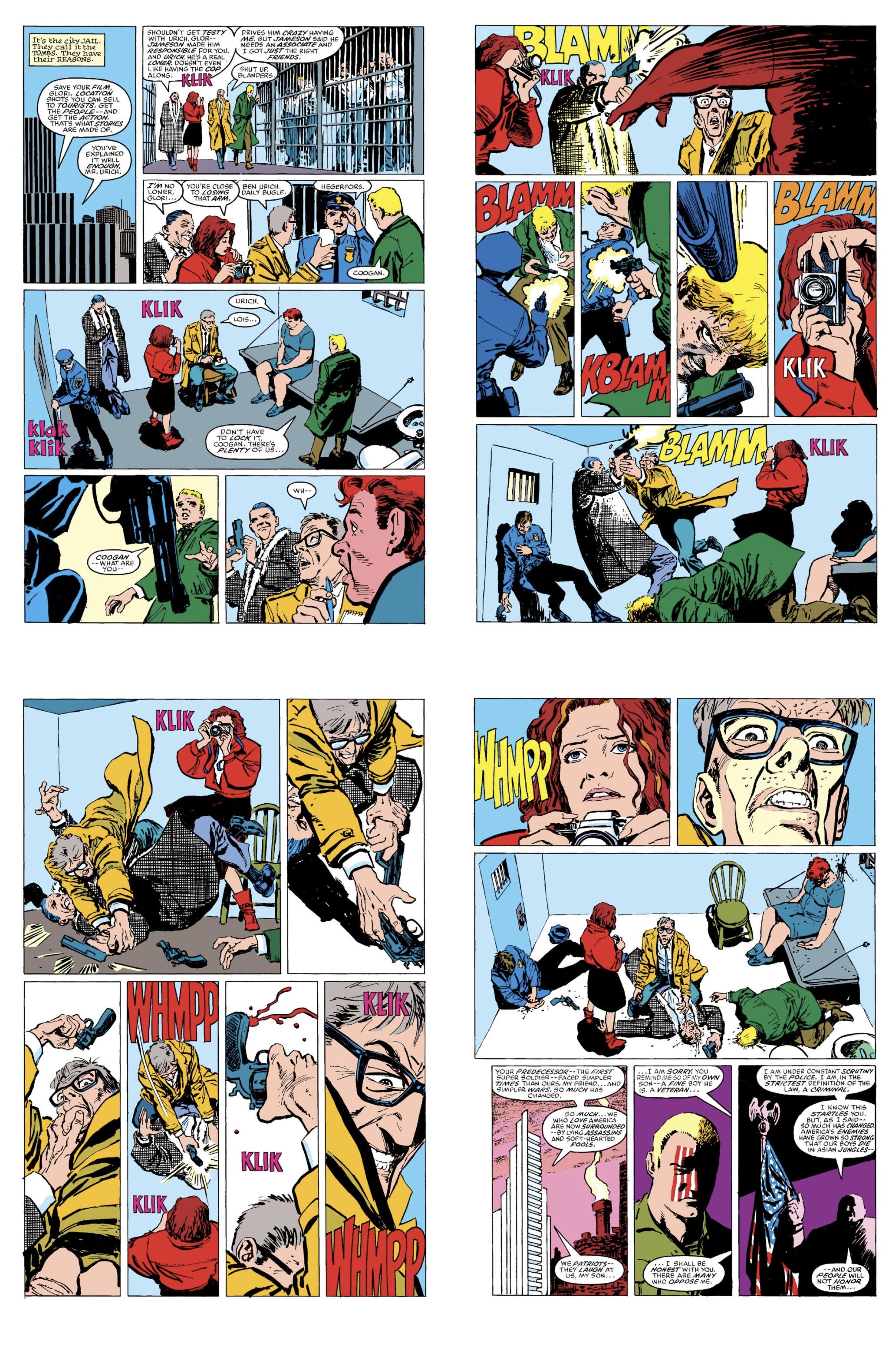
That’s the entire four-page sequence, complete with mid-page scene change. They’re breaking ALL the rules of superhero comcis with this one!
5:30: Kevin Smith and Joe Quesada Daredevil for Marvel Knights really did “save” the company by reinventing Marvel’s street-level characters back in the 2000s. Daredevil in particular had somewhat… floundered… for several years, before Smith and Quesada’s back-to-basics approach with the character that was heavily, heavily drenched in nostalgia for this specific story and era of Miller & Mazz DD work. In fact, it went so well it got Quesada the EIC spot at Marvel.
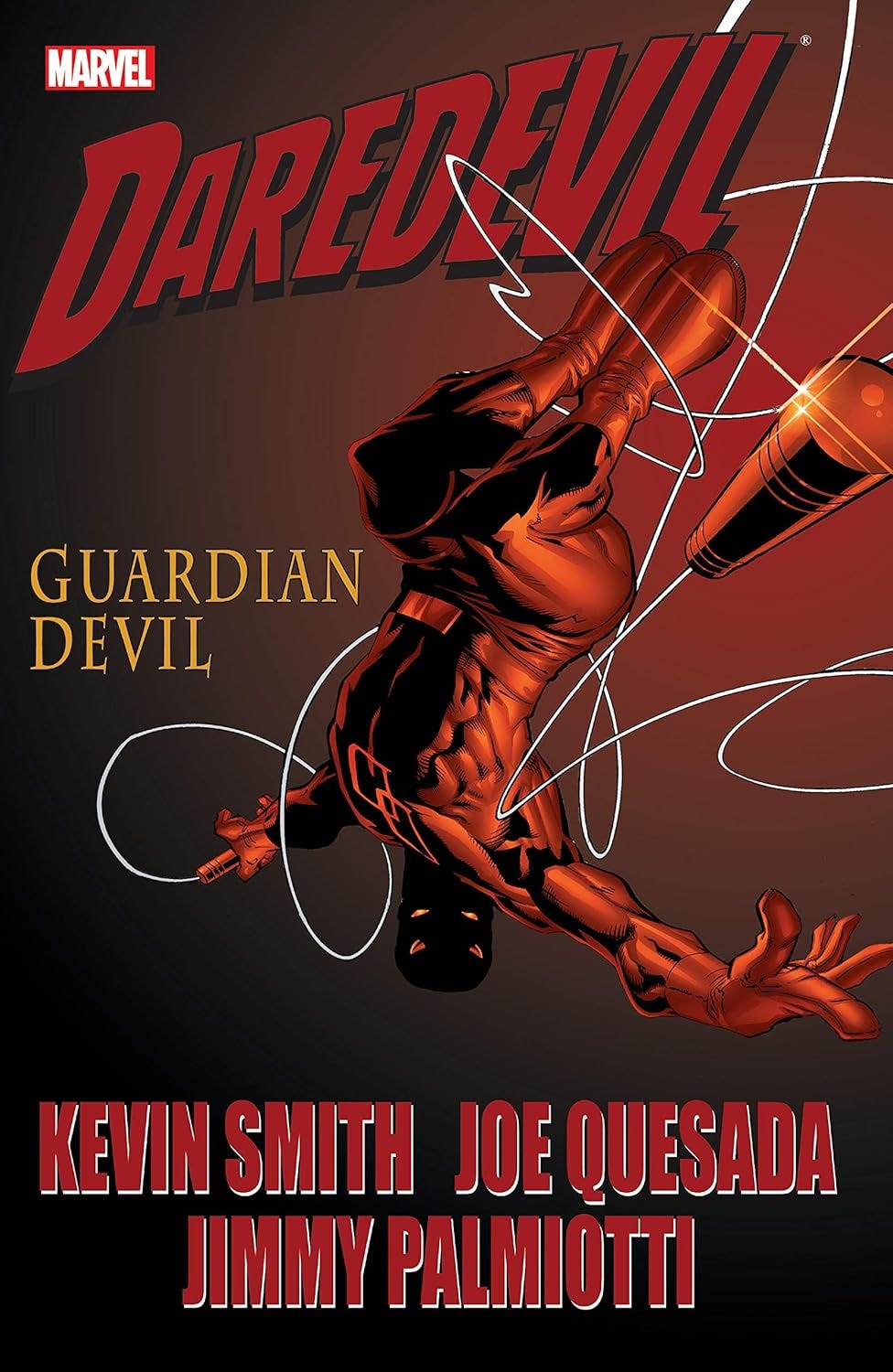
There’s probably a MUCH bigger essay to be written here, but almost everything that Quesada did during his tenure as EIC of Marvel, the back-to-basics-but-bigger approach that brought us The Ultimates and then the Avengers movies and MCU that followed really sprung from the Smith/Quesada Daredevil, and that sprung from… well, this. So when we talk about this being an influential story, it really, really is.
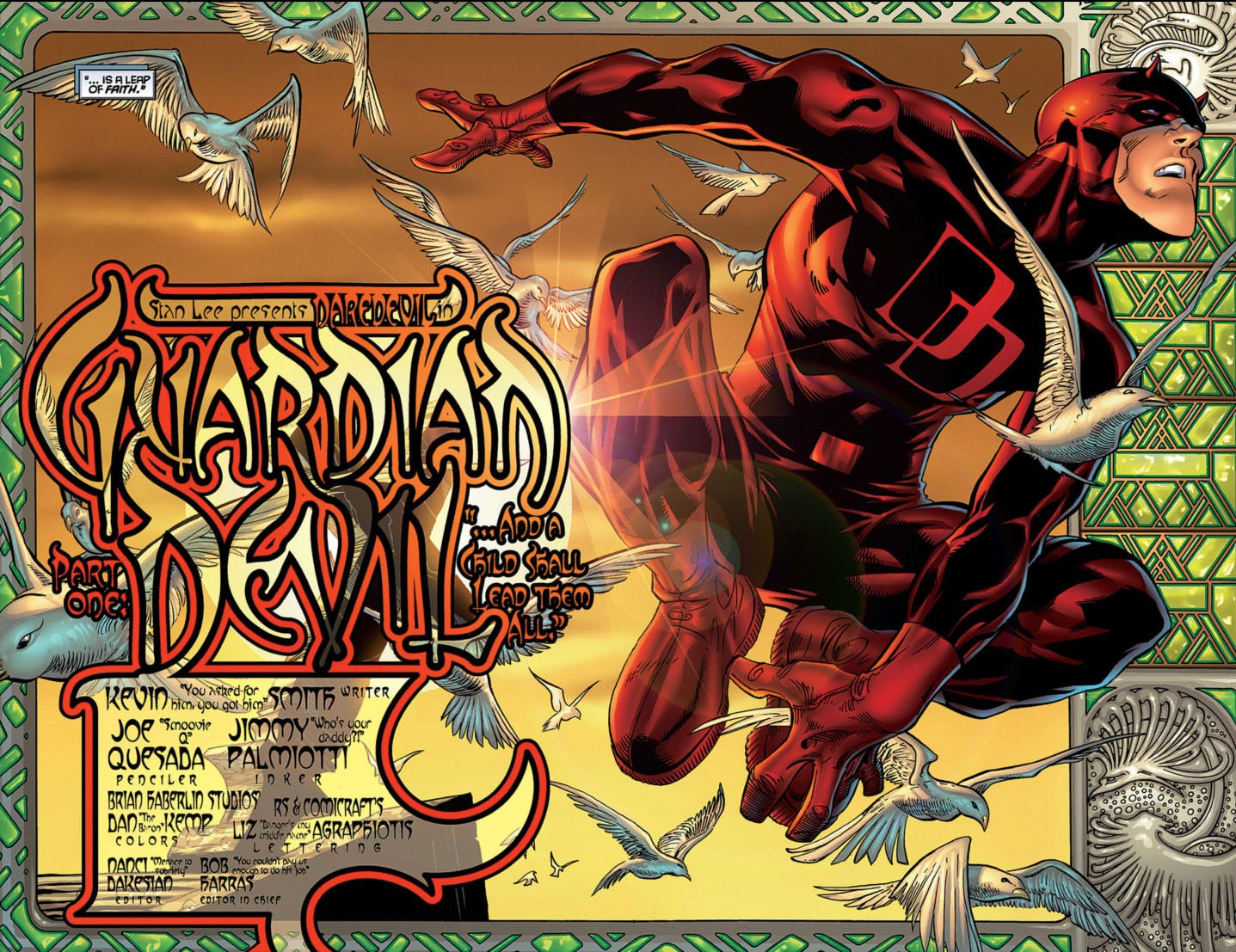
Worth noting that Quesada left Marvel and is now firmly doing his own thing. Read all about it on his Substack.
6:20: It’s funny because Deb hadn’t read a lot of superhero stuff, and so Chip picked this as Deb’s “comic book.” Turns out she read it, and that she also really liked this same duo’s Batman: Year One.
7:20: This is a chatty, chatty comic. Here’s an average page with all of the word balloons.

8:21 Betsy. Short for Elizabeth. Ben Urich’s wife and Nuke’s gun have the same name. I think we can just chalk this up to Frank Miller’s penchant for ‘classic’ sounding lady names, like you might find in a 50s pulp novel. That said, someone shoulda caught that in editorial, lol.
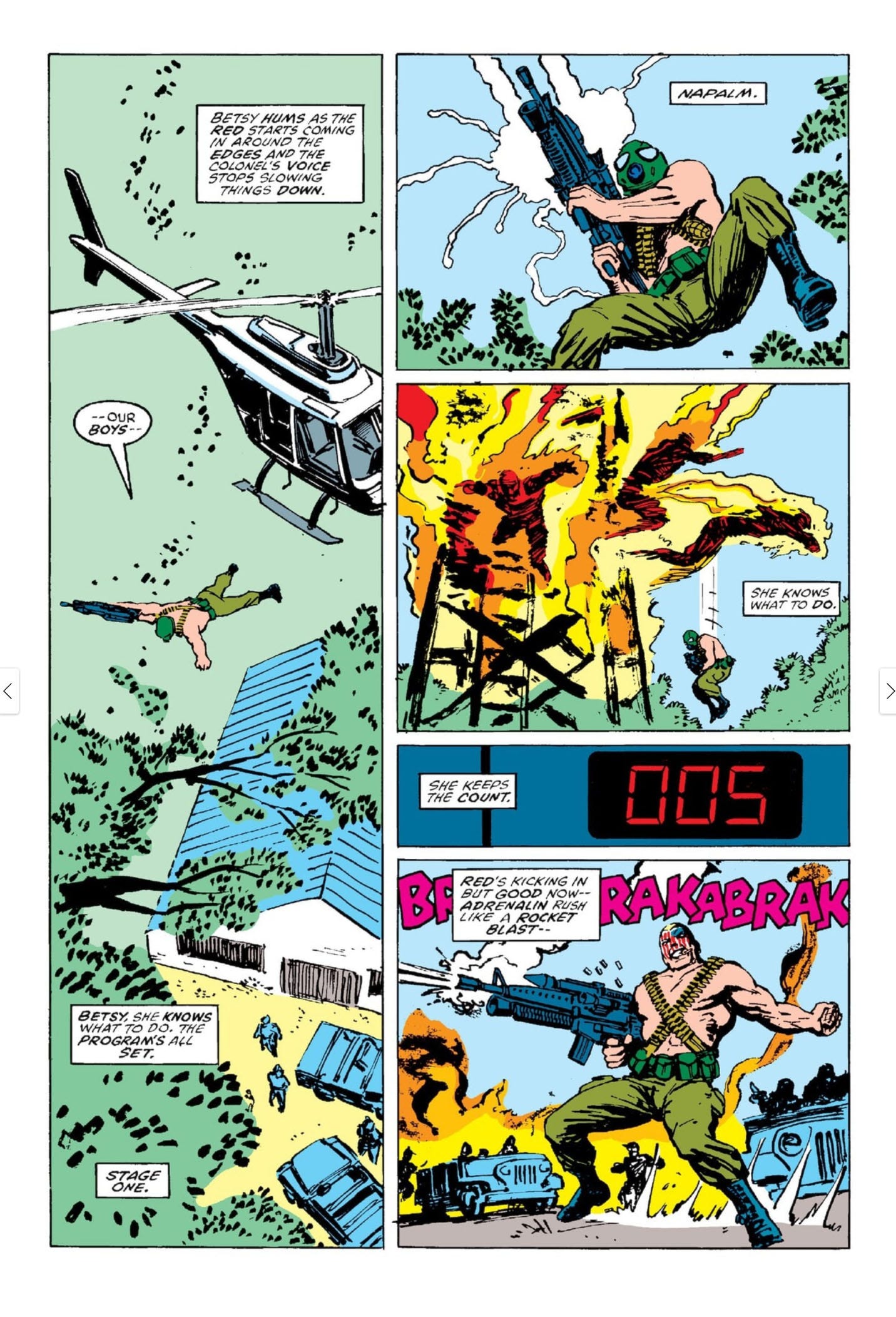
13:29 “He wears the flag.” “I hadn’t noticed.” Good comics, right there.
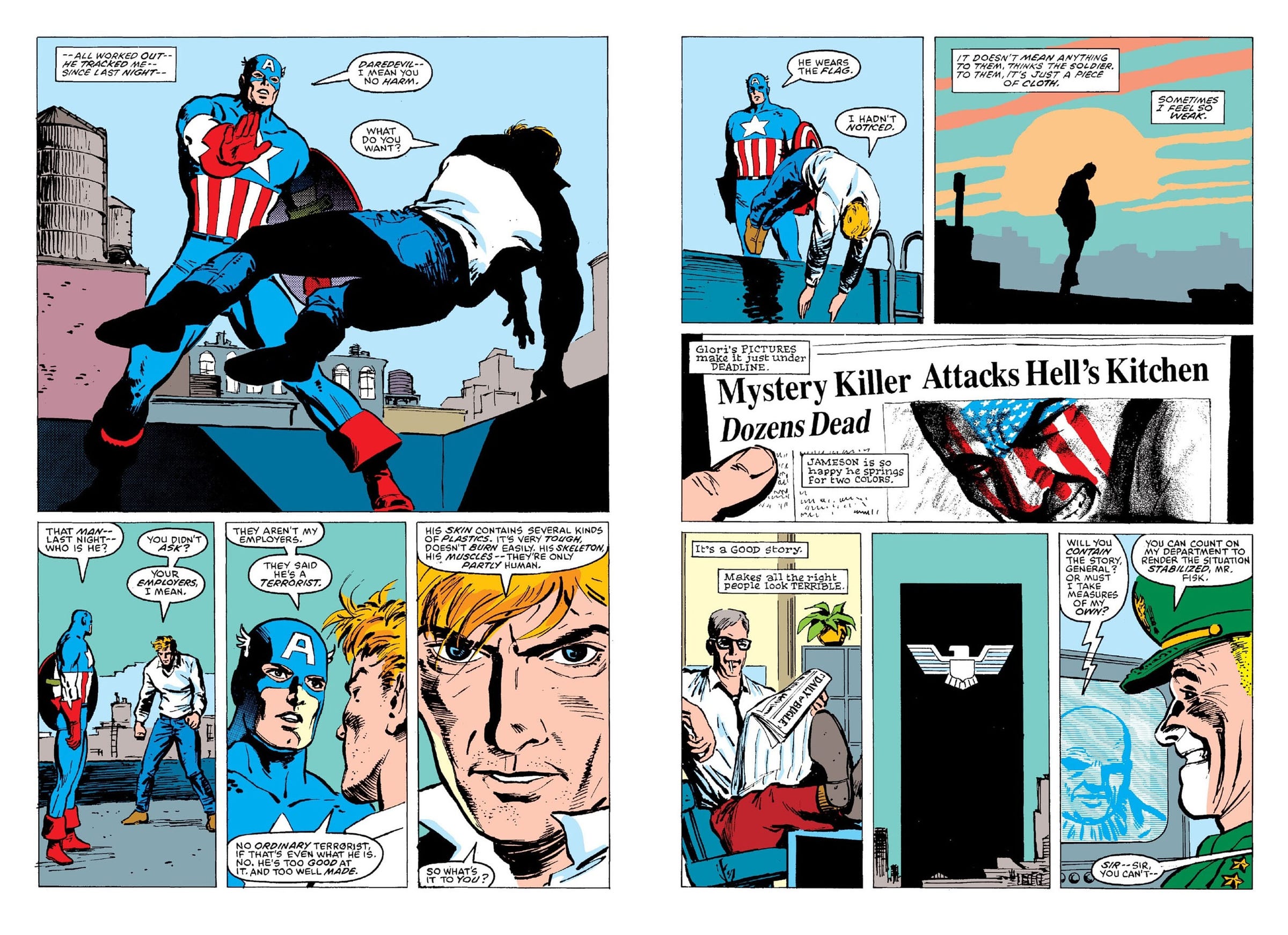
16:00 Keeping in the spirit of “ComicSplaining” this episode, which is to say things that manga fans might not know about: We should mention briefly that there are two different black-and-white editions of this trade paperback, that strip out all of the color and offer a look at the raw artwork. Unlike the Marvel edition that’s the product of several generations of degradation due to reproduction with color, for these B&W editions they went back to the original art (apparently artist David Mazzucchelli still had all of the pages!) and scanned them as “perfect” reproductions.
The Artisan Edition is a hardcover at roughly 11” x 17”, with the artwork printed at its original size. That 200+ page book will run you about US$150 (new printing coming in May) before any kind of discounts. The smaller Artist’s Edition is a hardcover that’s slightly bigger than the standard edition at roughly 8” x 12”, and has the same great art shrunk down for about US$50 before discounts.
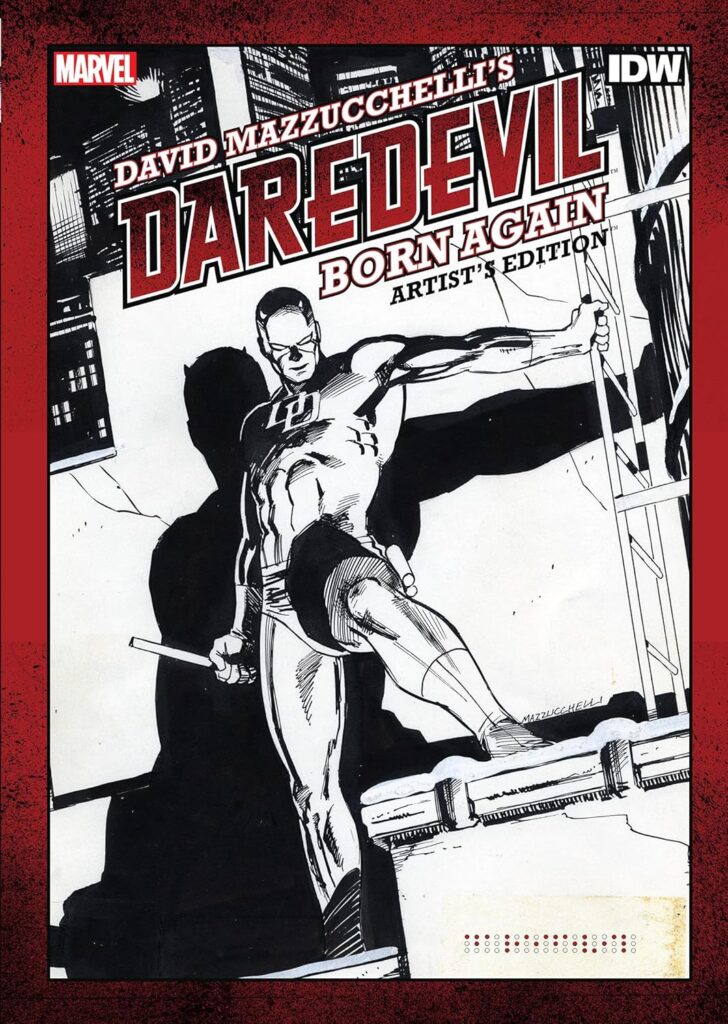

I know that they look the same size, but trust me, one of them is more than twice as big.
And here’s a look at some of those gorgeous B&W pages. Honestly, stunning.
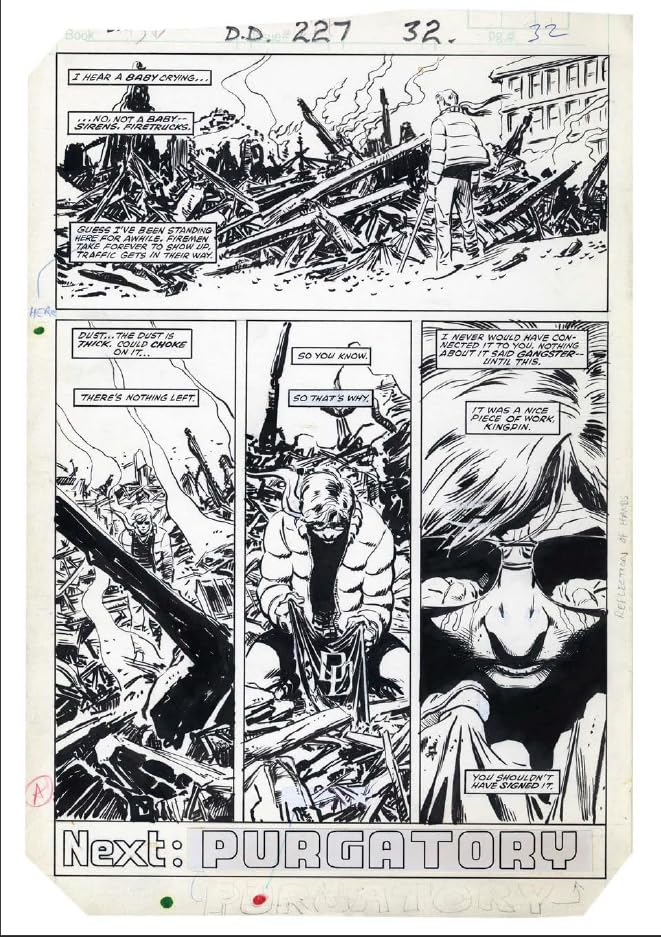
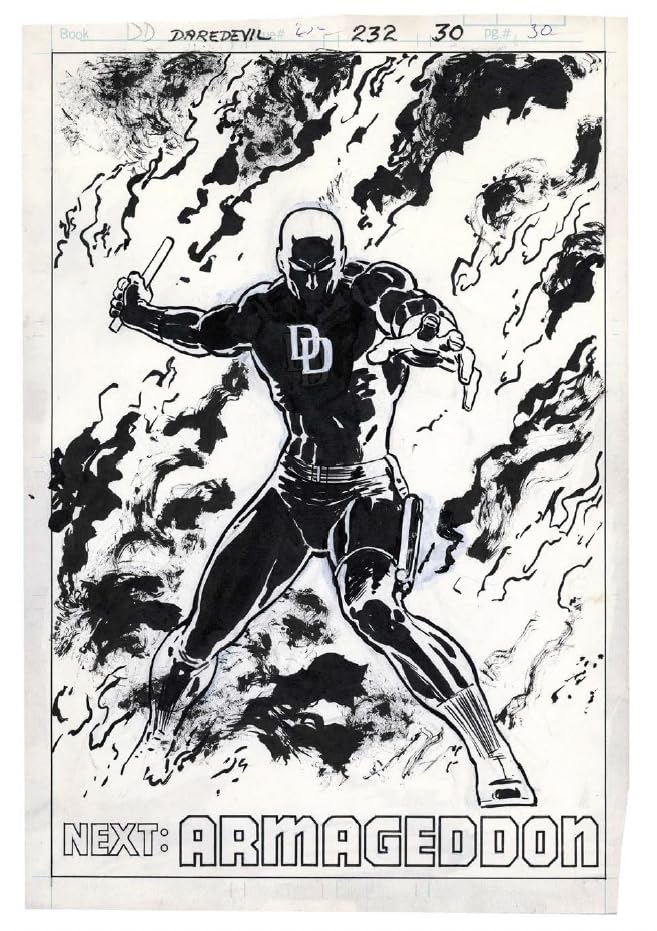

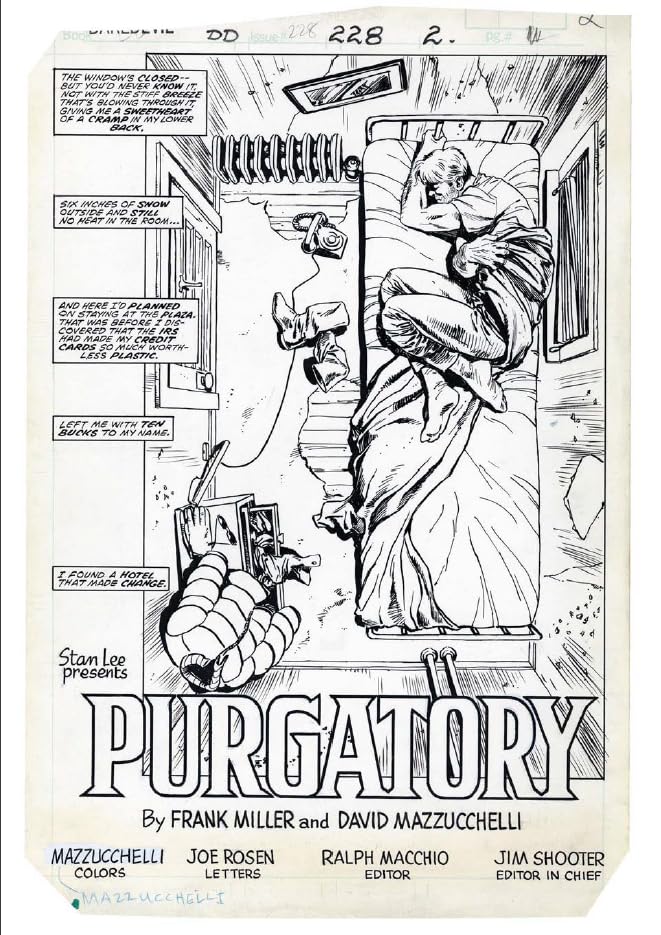
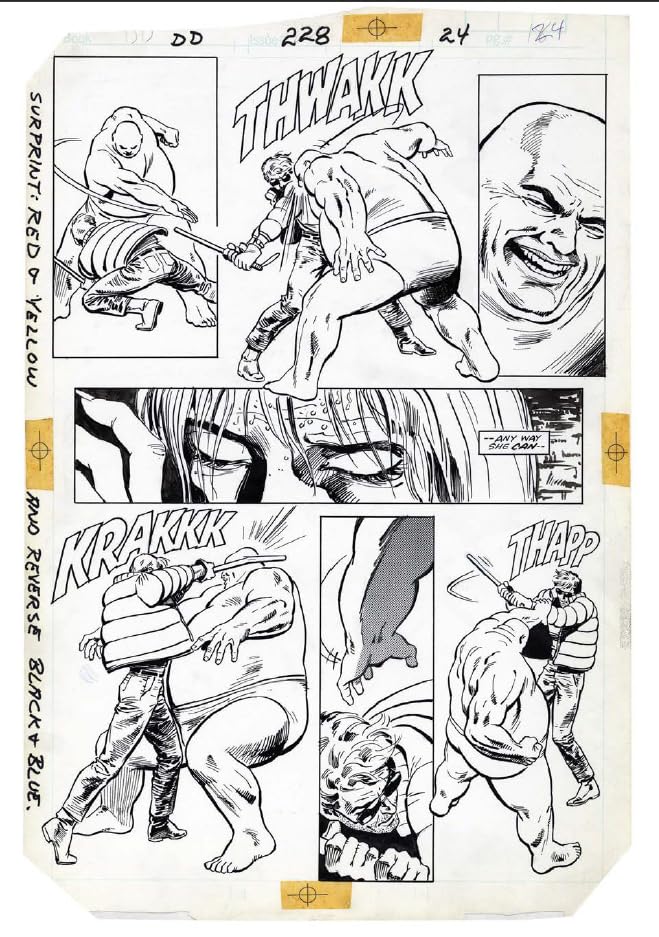
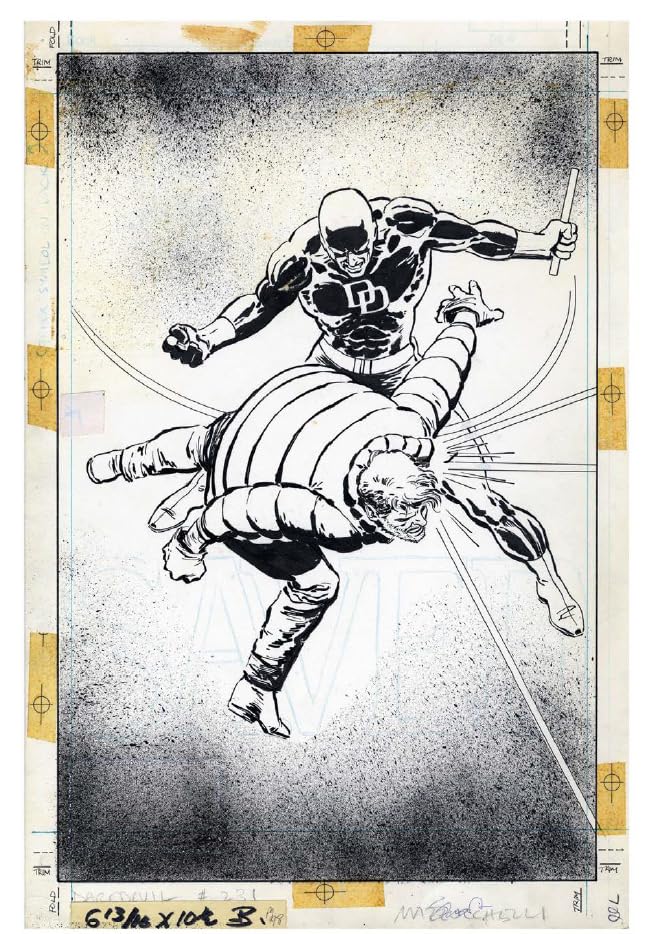
Honestly, the work is just SO MUCH NICER scanned from the originals than it is in the standard paperback. I kind of can’t believe they haven’t used these scans to go back and recolor/re-do the entire book in “hi-res”, because over time, woof, some of these panels have REALLY degraded. Maybe they haven’t because it would be expensive? Or maybe it’s because the artist/artisan editions were produced entirely by IDW Publishing, under the direction of Scott Dunbier (who left that company and has formed his own, ACT 4). I dunno! Strange times we’re living in.
17:24 So the nicest thing about the Artisan Edition existing is that it makes it much easier to actually talk about the art. The artist started using all kinds of traditional design techniques that weren’t largely a part of mainstream comics’ repertoire at the time, including markers, ziptone, and maybe even like washes and charcoal? It changed the whole look of the book, in a way that not even the muddy printing and bright colors could obscure. Take a look at this photo of the artist edition from AE Index’s review, to see just how unique these pages look:
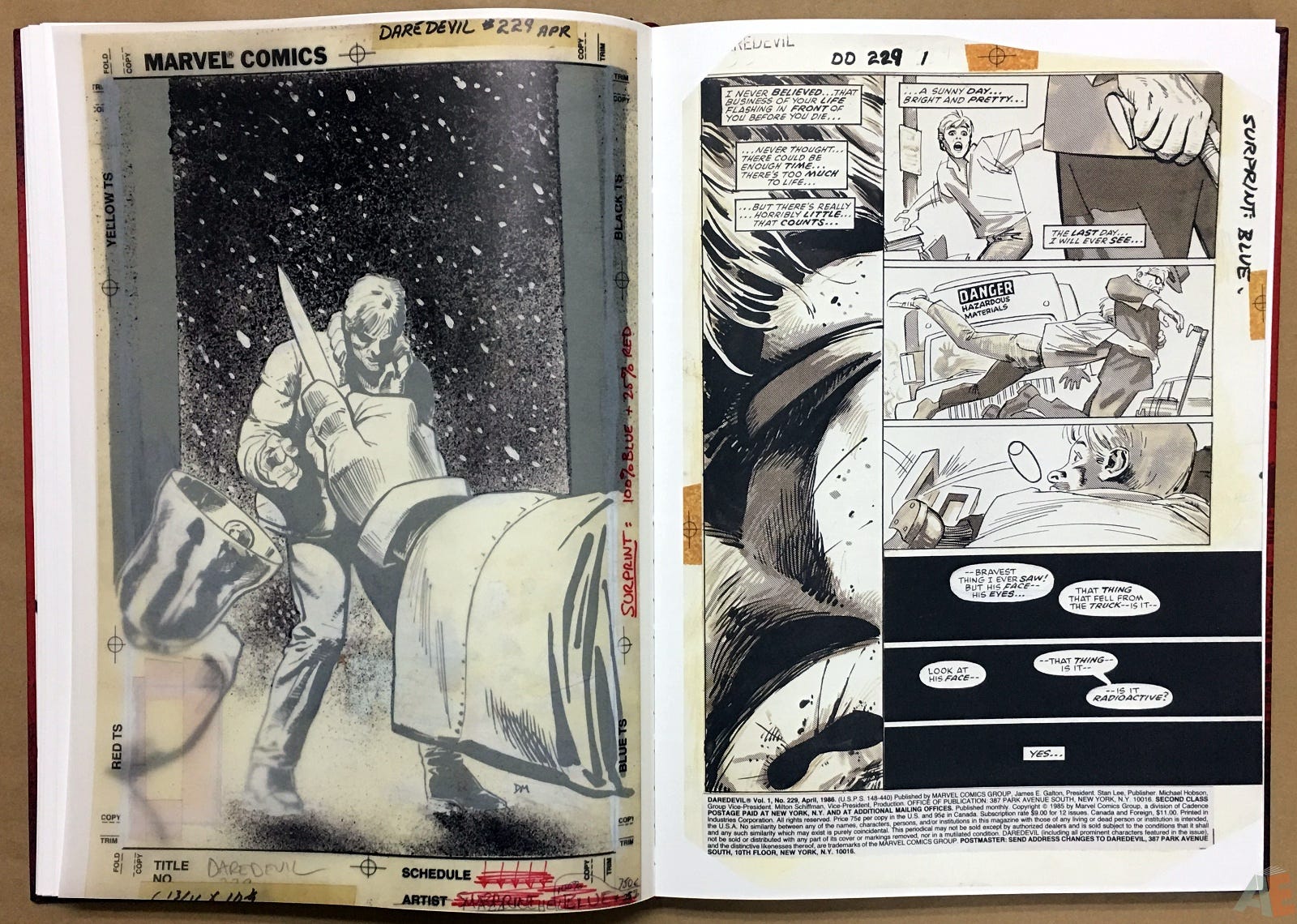
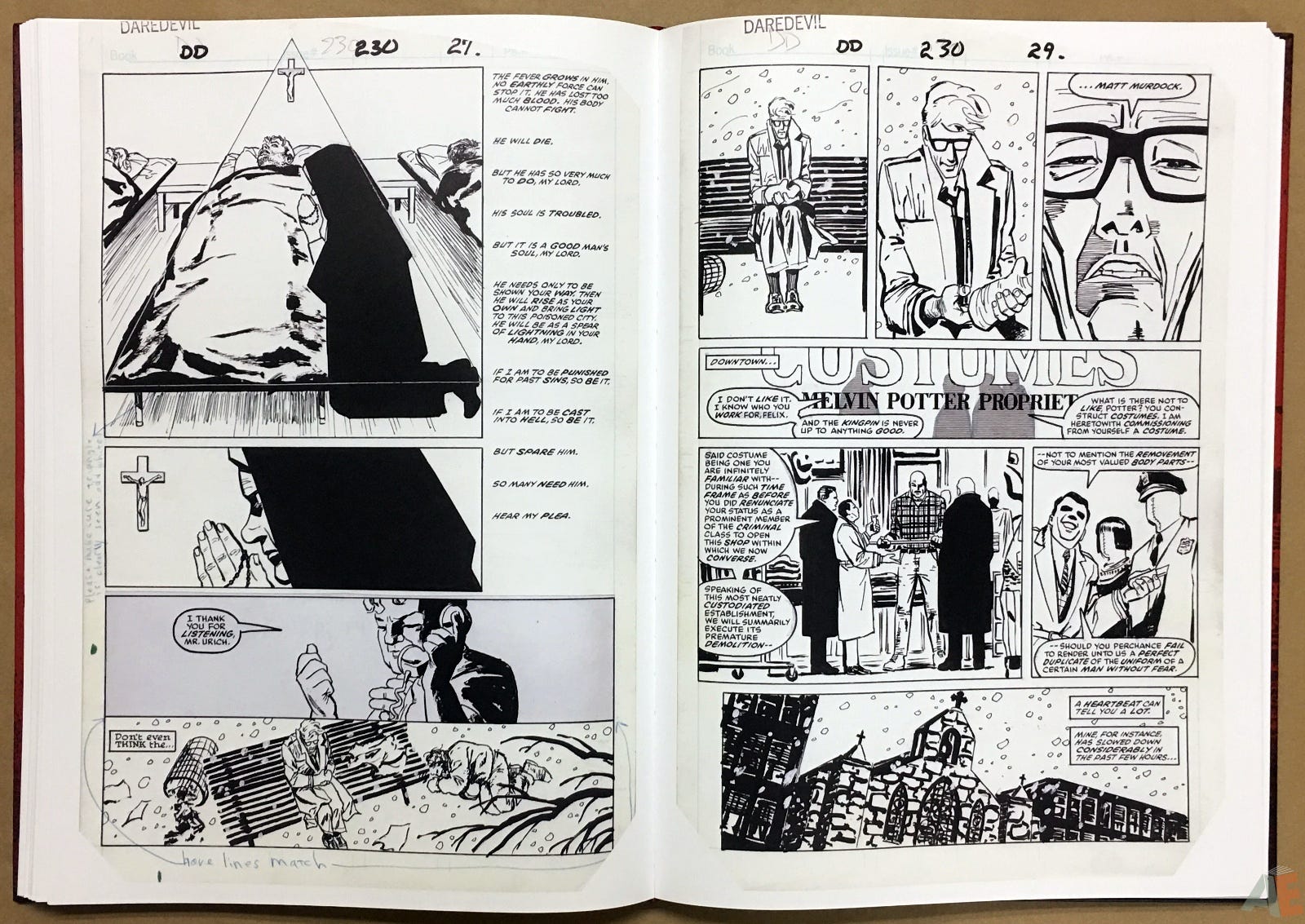
18:47 Speaking of color, we were impressed with the use of pin & red for the scene where J. Jonah Jameson calls Ben Urich a coward.

We also talked a lot about different visual effects that Mazzucchelli instructs the colorists to use, like color-holds to make the snow on the telephone wires stand our, or the ziptone on the crashed underwater taxi, or even when Foggy and Ben meet they do a full on black and white panel. It’s not even the first black and white sequence, with several sections of “flashbacks” told in black and white with tone. Here’s a gallery:
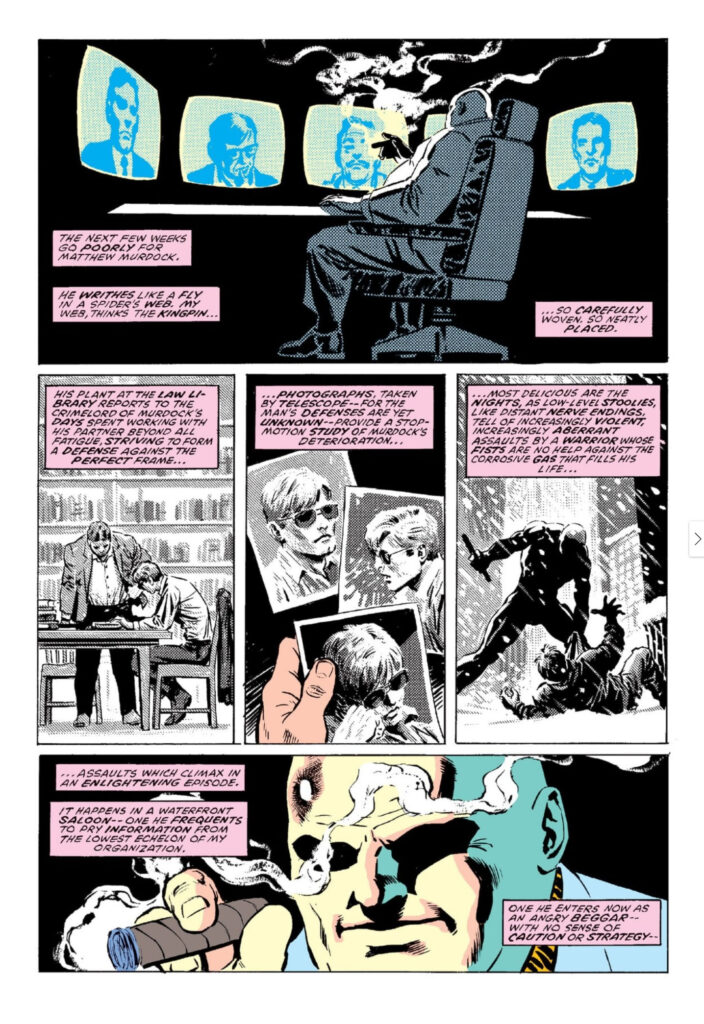
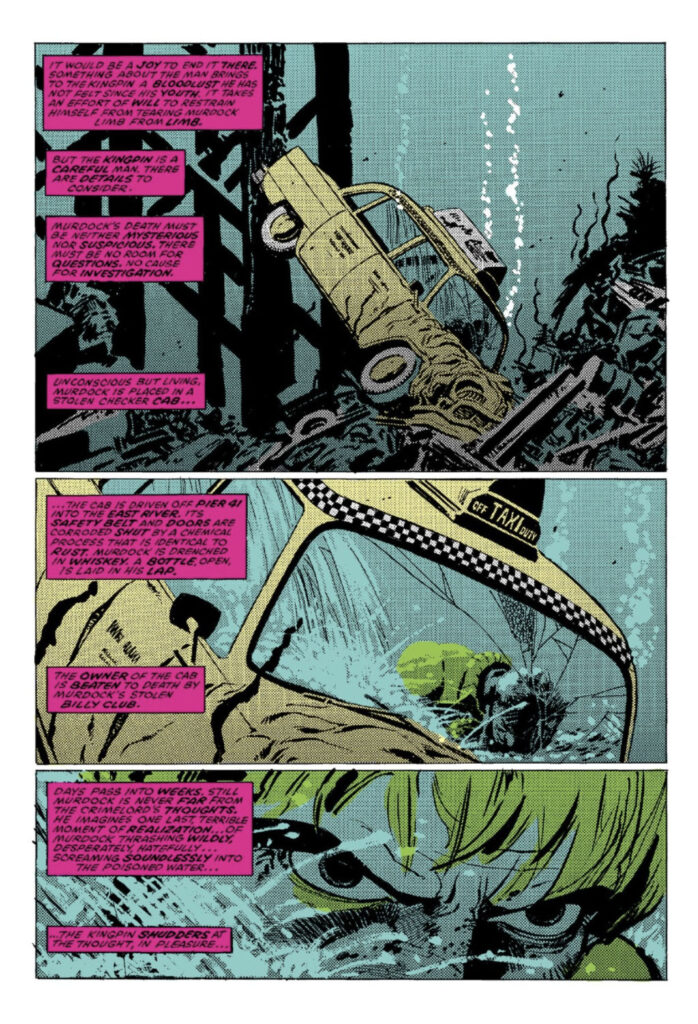
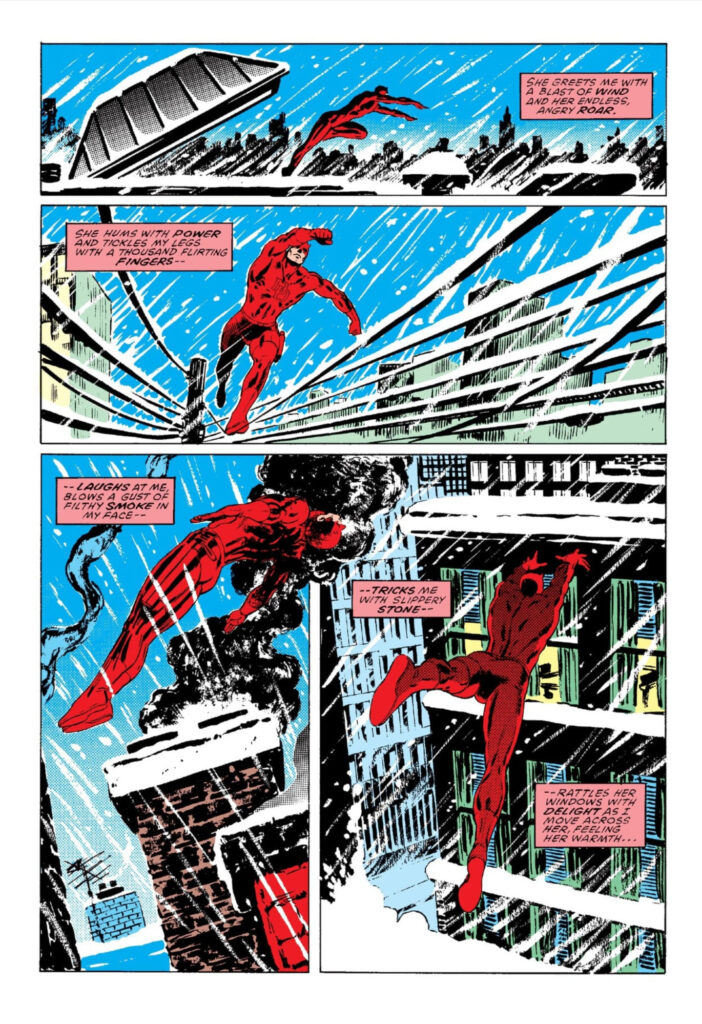
24:40 The Karen in Mexico sequences that start off the book are particularly visually unique.
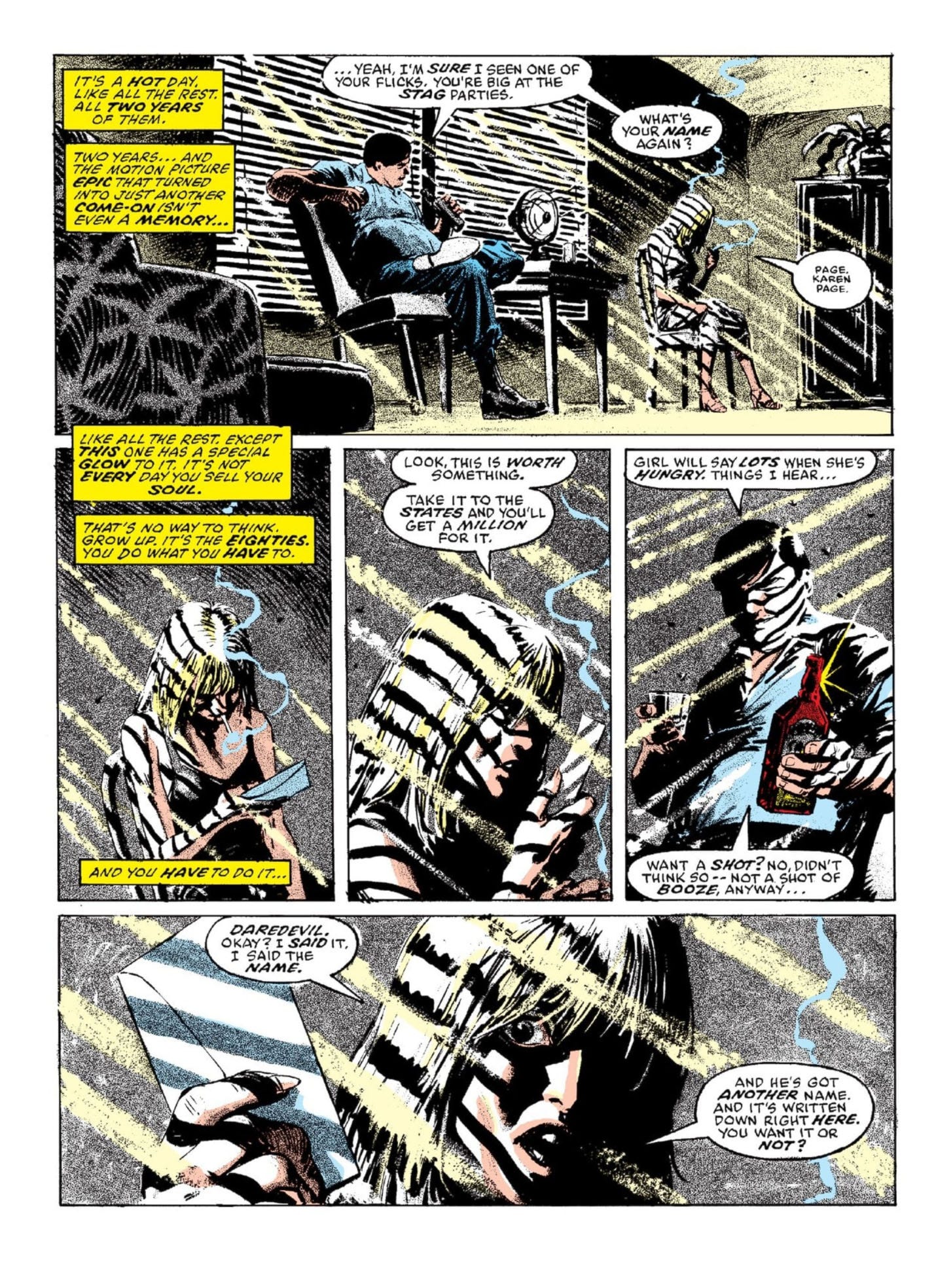
25:00 Talking about top-notch re-colouring, I think my friend Jose’s Villarrubia’s reworking of the colors on Bernie Wrightson’s Swamp Thing, or even his complete reconstructions of pages by Richard Corben in the complete Corben from Dark Horse, are probably the best in the biz right now. Quoting Jose:
Back on June 11, I posted a teaser image of the new restoration that I was doing of Absolute Swamp Thing. Since it had not been released, I could not post preview images. Well, now it’s for sale everywhere so here it is!
The two images on top are the recoloring that are featured in all the collections until now. On the bottom left is the original series colors and the last one is my recreation.
It is amazing the subtle effects that colorists (in this case probably Wrightson himself) could get out of the old technique on newsprint!
- Jose Villarrubia
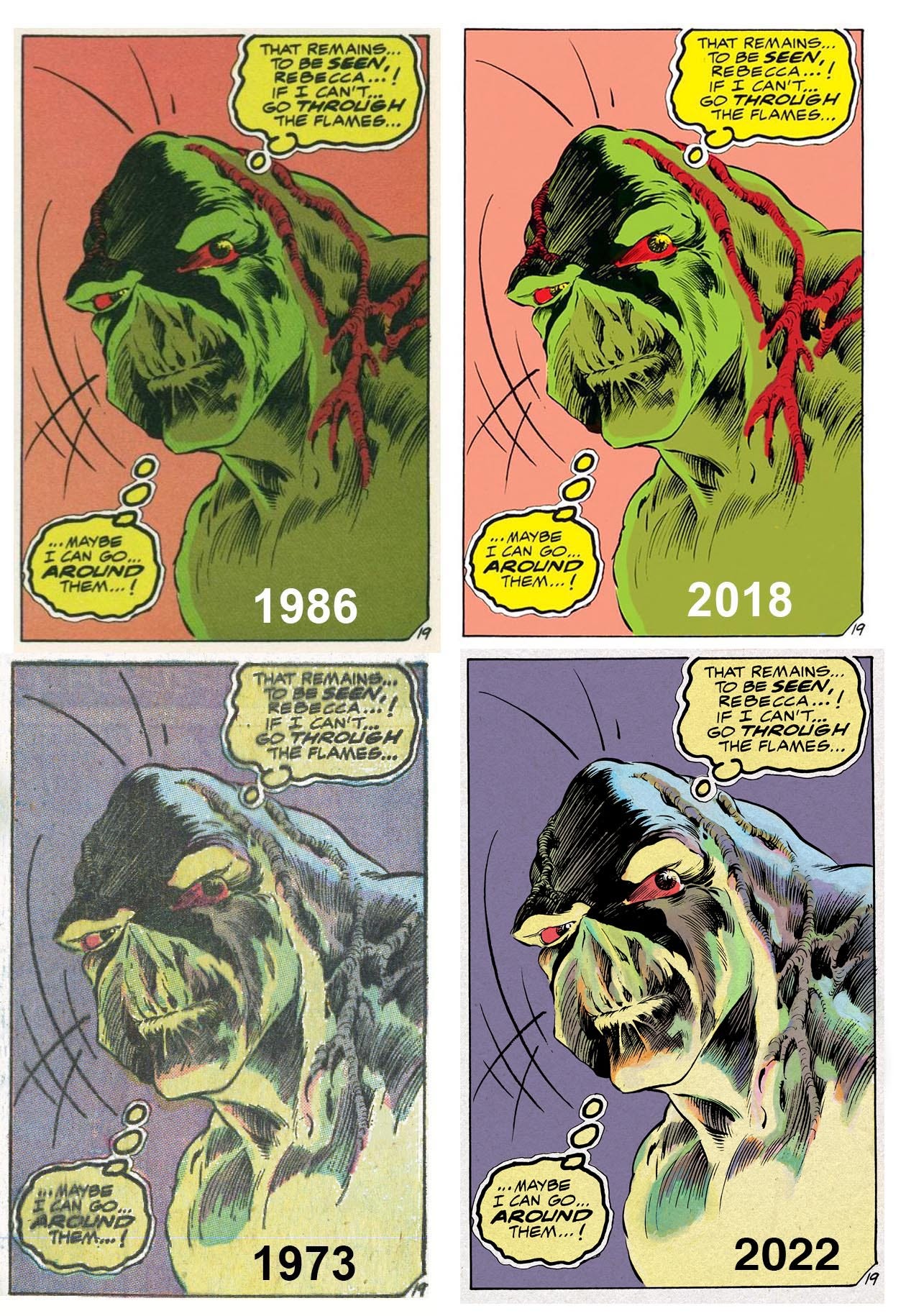
So yeah, when we talk about the recoloring that needs to be done to make this project look and feel like it must have when those issues were first released, I think this is what I’m getting at. I know it’s possible, but does Marvel want to actually spend the money to do it right? Because right now it feels more like the ones at the top, in my opinion.
26:38 Ben Urich, page 139, eyes are spirals. Nice touch!
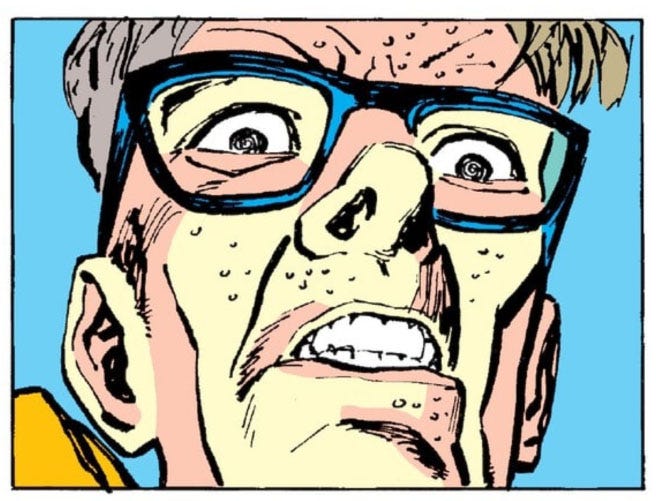
27:58 When he’s on the phone in the newsroom, interesting use of wide panels.
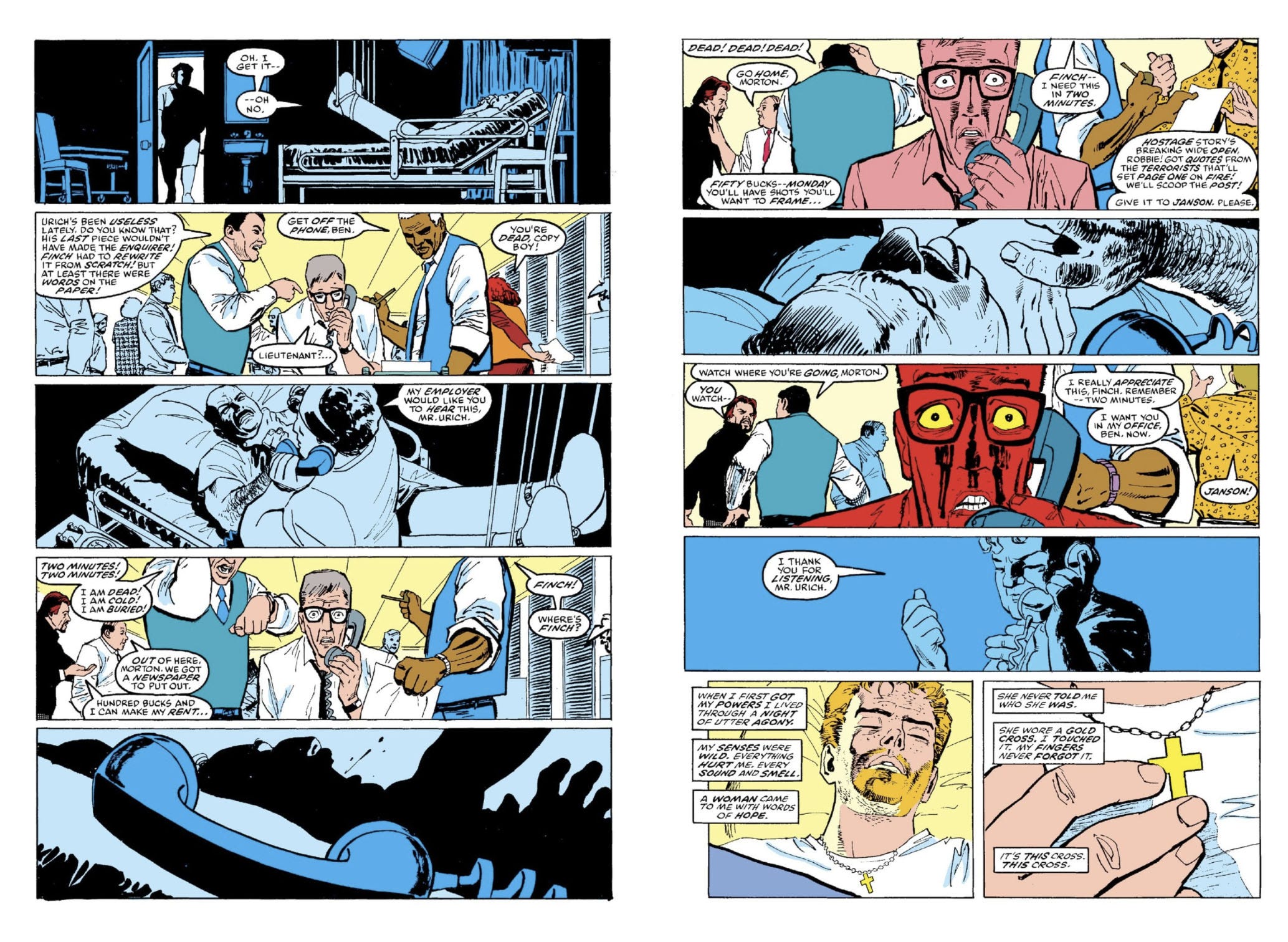
29:55 The book starts out with an omniscient narrator at the beginning (those yellow caption boxes up top), and switches narration styles and types frequently. Deb found it confusing, but Chip feels like Miller was just trying stuff out. You can see the narration changing repeatedly through the images we’ve already shown. It’s sometimes clear who is speaking, but unless you’re really “in” the story, sometimes it very much is not.
35:31 Yeah, if you’re reading this an issue at a time on the Marvel app, after this storyline we get two “fill-in” issues featuring story and art by Steve Ditko, and then Barry Windsor Smith! It’s kind of a wild situation reading this book an issue at a time, with so many huge swings in style and tone, particularly after a genre-defining and character-defining run like this. It’s one of the reasons manga fans prefer manga, one* creator’s hand directing the story from start to finish. We’ve already used so many images this episode, you’ll just need to trust us here.
39:00: Chip wisely points out that the book was [likely] running late due to the amount of work Mazzucchelli was putting into the artwork,, and so the opening pages of the chapter “Parriah” or mostly one illustration, reproduced, with large pieces of text. It’s a striking moment in the book and doesn’t read like a fill-in at all, but it is pretty great.
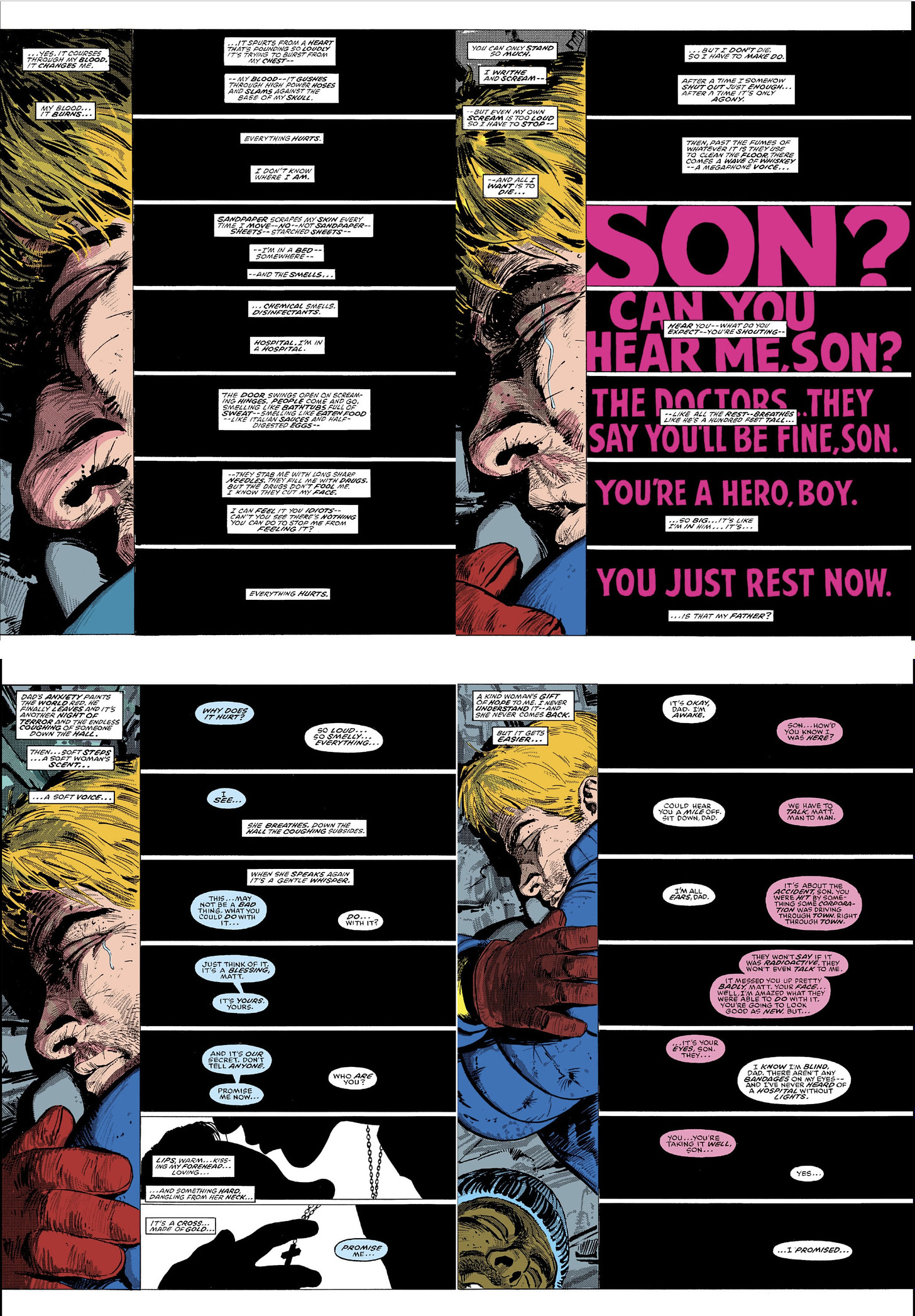
41:25: The single page with the appearance of the avengers is so completely different to how the characters were previously portrayed. Really interesting, and I don’t think it was really picked up on again (to my knowledge) until Kurt Busiek’s MARVELS, seeing these characters as larger-than-life Gods. Chip gets into the idea that comics changed drastically after these books came out… It’s hard to deny.

Since we have it from Amazon, here’s the rescanned version of this page from the original art. It’s pretty clearly much crisper, even being viewed as a compressed JPG on a small screen.
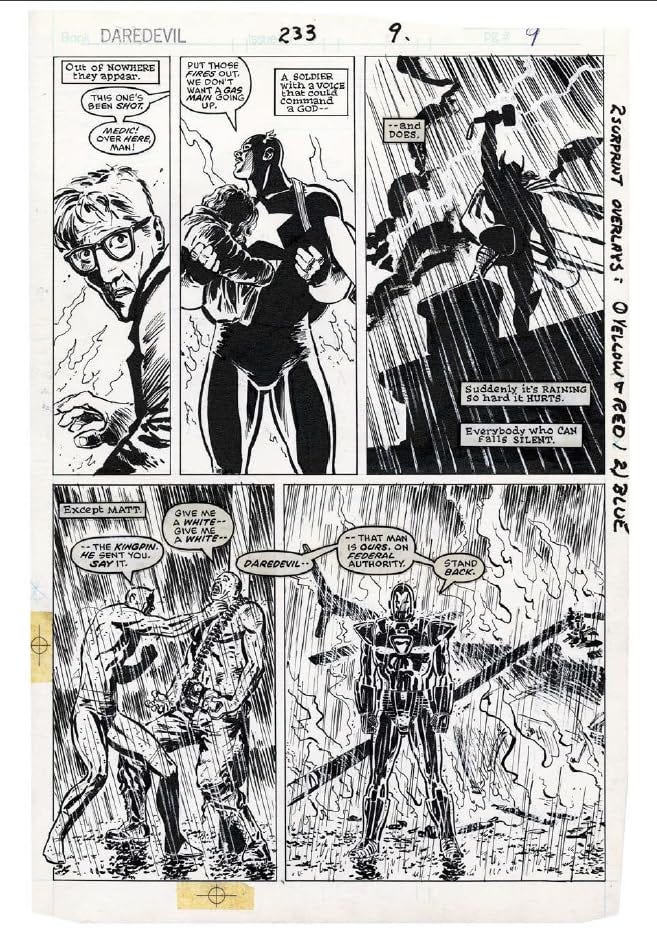
44:50 We all heard that, David.
46:00 I think what Chip is saying here is honestly true, that if you’re going to keep working on these characters with 70 years of history, you need to pick and choose and try to do new work. But Deb’s criticism that it’s inconsistent and unenjoyable to her is also valid. As we’ve discussed on the podcast I’ve run into my own problems because of the compromises that need to be made to work on these kinds of books too, so I get where they’re both coming from.
55:30: IT’S TRICKY
Now you know what goes through my head anytime anyone says IT’S TRICKY in any context.
1:09:20 I love when Chip is at his chippiest, because this story is killer. “FAPP FAPP FAPP” is the perfect sound effect, as evidenced by Matt Murdock and the punching bag:
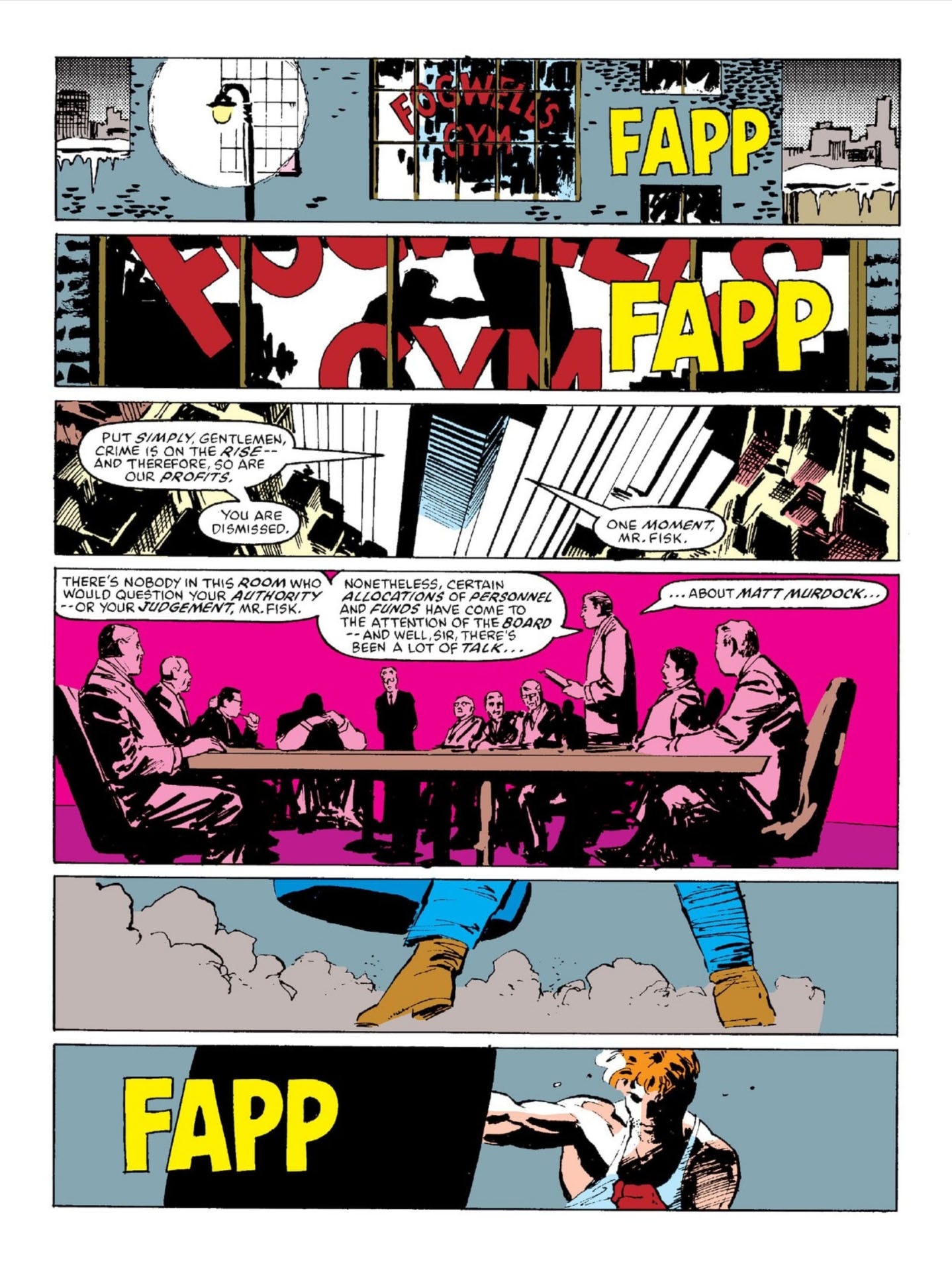
It’s a shame we’ll never, ever get that again due to “evolving language usage.” Hahaha
1:10:00 Deb just checked right out when she first opened up the book. The whole sequence with Karen in Mexico is meant to be sweaty and ugly and bleak and offputting, and I guess it worked!
1:10:47 “Almost like a different language…?” It’s really interesting and that’s what, at least for the first few seasons, that’s entirely what this Podcast was about; Chip coming from American comics and seeing this totally different storytelling language, or maybe dialect, and finding out how it works and adjusting. Chip talks about it really well here.
Deb brings up an interesting and then-recent tweet from our pal Jim Zub about the necessities of modern single-issue comic book writing, where you have to grab readers early, have a fight scene, have an important moment, all for the adrenalin hit and making sure readers feel like they got their money’s worth.
If you want to see the tweet it’s here: https://x.com/JimZub/status/1752673665471168640
But it looks like Jim wrote the whole thing up into a “Comics School” post on his patreon, you can check that out here: https://www.jimzub.com/dont-fight-the-format/
1:13:00 We only cut out 4 minutes! Probably blank spaces. You’re getting a LOT of unfettered us, on this podcast.
1:14:00 Too many words, says Deb.
I’m making my own fun writing these notes. 😉
1:14:10 Kingpin won’t shut up! Rich people, amirite?
1:15:30 Deb just called Chip a Disney Adult, and damn that’s perfect. Marvel fans are now officially Disney Adults. You heard it here on the MANGASPLAINING PODCAST.
1:18:10 David Mazzucchelli, yeah I didn’t actually read EVERYTHING apparently, I actually just meant City of Glass and his work on Rubber Blanket, lol. Thanks to my buddy Gary for pointing out that he did some Indiana Jones, and apparently he inked Michael Golden on issue #31 of G.I.Joe? That’s… bonkers. Haha, I’d love to see that. I wonder if it’s online somewhere legally.
Also wanted to include that the story Daredevil: Year One expands on the scene where Matt got his powers in this volume, and that scene is tied to the origins of the Teenage Mutant Ninja Turtles in the original cannon, with the same cannister that hit Matt breaking and coating the turtles and Splinter. So, now you know!
And that’s this episode!
1:20:52: THE BREAK
It’s time for PICKING BOOKS! It’s a tricky one, this week.
We start off with David tricking Chip into picking a heavily out of print, no-digital book, Short Cuts Volume 1 by Usamaru Furuya. Uh, I have no idea how any of you will find and read this legally, my apologies. It was published by a version of VIZ Media that no longer exists.
Deb tricks Chip into picking The Fable, volumes 1 AND 8, by Katsuhisa Minami and published by Kodansha.
Christopher picks Taiyo Matsumoto’s newest comic, Tokyo These Days 1, published by VIZ, which is the most obvious possible pick for Christopher to make.
That means upcoming comics list looks like:
- [Special Episode TBA coming very soon]
- Guardians of the Louvre, by Jiro Taniguchi
- Kaiju no. 8 vol. 1 by Naoya Matsumoto
- Dogs Red, by Satoru Noda
- The Fable vol. 1 & vol. 8 by Katsuhisa Minami
- Tokyo These Days vol 1 by Taiyo Matsumoto
- Short Cuts vol. 1 by Usamaru Furuya
SHOUT OUTS!
David shouts out a specific page from a book I don’t own so I can’t do much about that? But Matt and Karen hugging from Daredevil: Born Again is nice, even with their almost sketched in backgrounds.
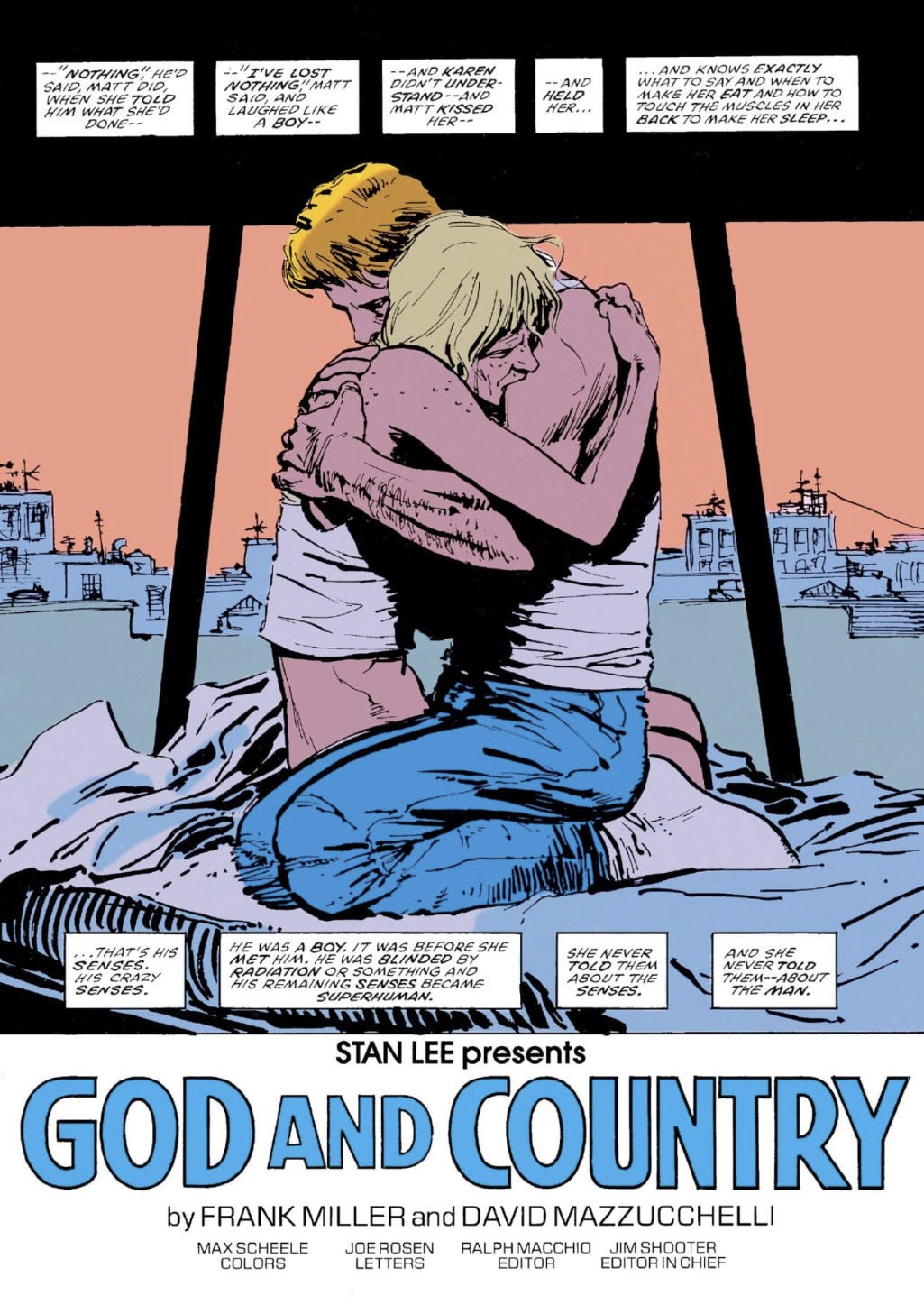
Deb shouts out Hip Hop Family Tree by Ed Piskor, published Fantagraphics. As a reminder this episode was recorded back in February, 2024 before everything went down.
Chip picks Daredevil: Born Again Artist Edition/Artisan Edition, whichever you’ve got the budget for. Which we’ve referenced a bunch.
Christopher recommends Ryan North’s run on Fantastic Four. And yeah, I gave the germ of the idea of what Ryan did with Franklin Richards but took it in an entirely different direction. Also, it has Dinosaur Doctor Doom in it, which is pretty great.
And that’s an episode of Mangasplaining! This episode is also available wherever you get your podcasts, so please subscribe and leave a review, so others can discover our show.
Thanks so much for listening! Please support your local comic and manga specialty shop when purchasing these books, and you can find one near you at comicshoplocator.com. You can also check your local library for print and digital lending options, they have TONS of manga! Finally, thanks to D.A.D.S. for their musical accompaniment for this episode.
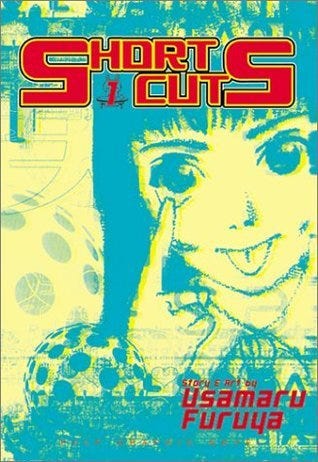
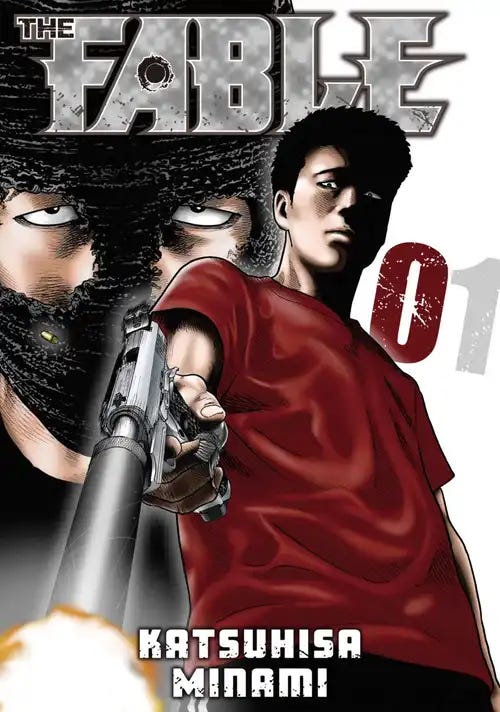
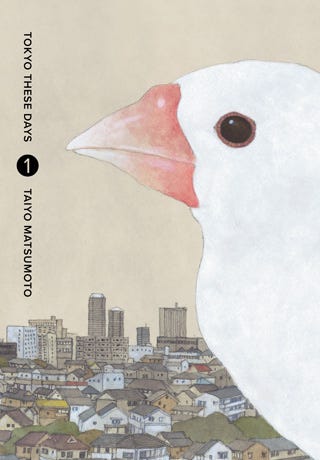
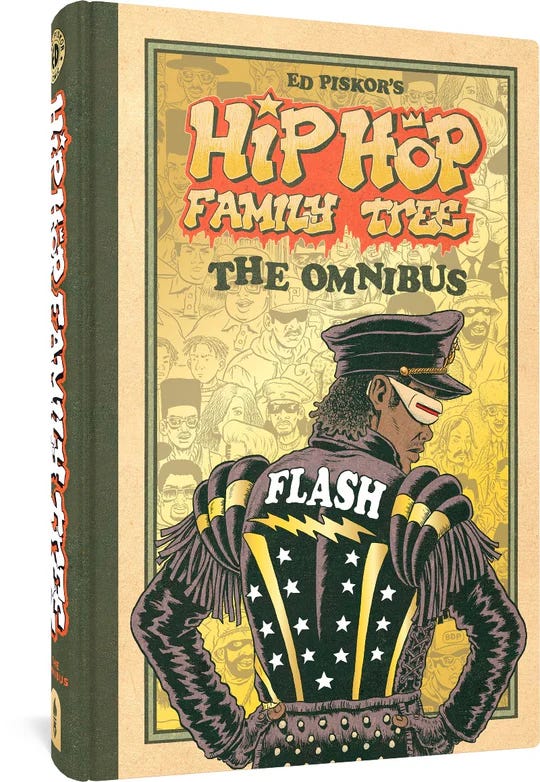

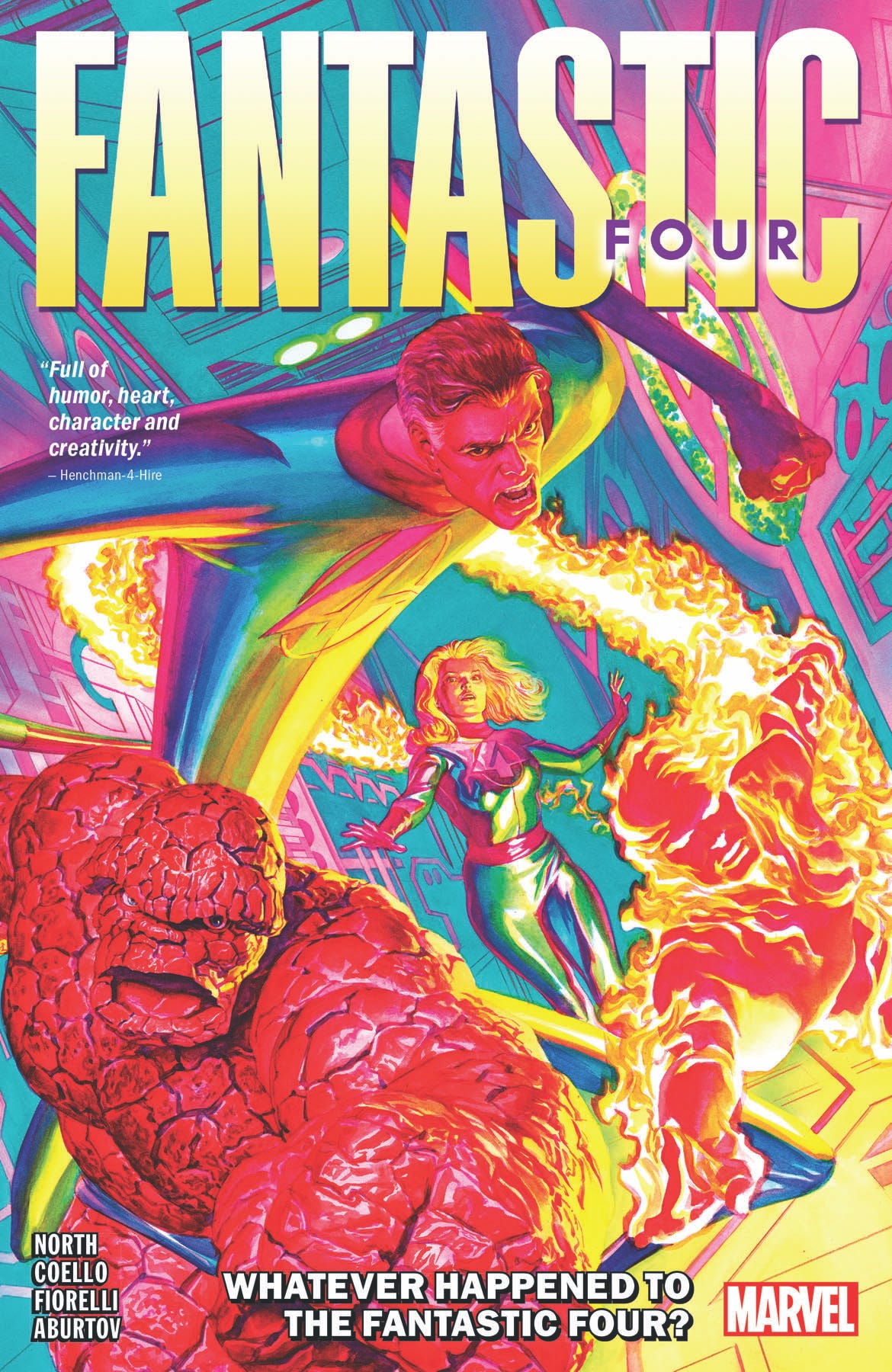
Christopher, I accept your apology!
Lots of love!
<3
Always a danger to make a comment before the show notes are up, but will that stop me?
This was really great–and actually far more interesting than I expected. It helps that aside from a lot of Claremont X-Men (and stuff like Swamp Thing and Sandman if they count?) Miller’s Daredevil is one of the few superhero comics I know really well and that I got obsessed with as a teen–I think through the three volume set (plus Born Again) that David mentioned? But it had been decades since I’d pulled my copies off the shelf, so it was great to give this a re-read (and yeah, as Deb mentioned, from my “now” perspective all that stuff with Karen doesn’t just feel edgy like it did as a 90s teen but… not well done at all, and I was a bit surprised you didn’t get more into that, though on the other hand I was glad you didn’t get into all the issues with Miller which luckily aren’t too relevant to his early work here.) I admit, otherwise my Daredevil knowledge is a blank, the TV series aside, though I’ve always meant to check out more of Ann Nocenti’s run (I have one collected volume) and of course the work being done by a certain mangasplainer.
So it was kinda wonderful to have Chip, who knows these works intimately in (almost 😛 ) every sense of the word. And I LOVE the discussion about colouring–I live for this kind of talk, and like Chris belong to some FB groups devoted to comparisons. (It’s interesting, when Moore’s Swamp Thing was first put out in hardcover, the first volume did have a slightly more newsprint quality that made it look great–and fans complained and IIRC after that they went to their normal paper stock… Still looks better than the shit re-colouring of the Moore run for the Absolute editions.
Again, because at this point I feel like I know and understand the manga world far better than the mainstream superhero comic world, I was fascinated to hear things like about the importance of writer/artist teams on Daredevil. I admit I feel some shame that when I do delve into this world, I pay secondary attention to who the artist is than the writer (maybe it’s because in the early 90s as a kid the main comic I read was Sandman and I just got used to thinking “ah interesting, a new artist… anyway…” ) Stupid, as for me so much of the appeal of comics and manga is the visual storytelling, and I’m good friends with a queer comic creator who has worked for Marvel but only as an artist (when self publishing he writes as well.)
I will say the more and more I delve into 1970s (and 60s!) shojo manga the more I realize how a lot of accepted manga rules don’t apply. It was VERY common, for example, for scene changes to happen mid page (it took me a while to get used to this) as Chip mentions with Daredevil but something being rare in modern manga. Also, while a lot of 70s shojo was all about the montage page layout with just bits of floating text, there also are some classic titles that are chock-a-block with text. Stuff by Year 24 members like Toshie Kihara’s Mari to Shingo, and Ryoko Yamagishi’s Emperor of the Land of the Rising Sun–peak classic shojo–will have panels that are virtually all text, which makes me *really* struggle with them. I think some of that came from the fact that at the time it was still not taken for granted that manga, especially shojo manga, would ever be collected in tankoubon, and so people were expected to ONLY read the manga in large format magazine pages, not little paperbacks.
And the more I hear about superhero comics and how they’re made and the various fanbases, the more I connect with a similar fandom–American soap operas. Deb talks about how strange it feels to her to follow a story and characters when the original creator stops writing (and drawing!) them. But maybe that strikes me as less strange because I grew up obsessed with soap operas (well the interconnected Agnes Nixon created soap operas–All My Children and One Life to Live plus a few short lived failed ones like Loving, specifically.) So by the time I was 10 I became aware that the headwriter credit would sometimes change and suddenly you’d notice changes on your soap. Maybe a bunch of new characters, maybe the tone of the soap would change (AMC was a “realistic” soap but when the campiest of soaps, Days of Our Lives introduced stuff like Devil possession, suddenly networks pressured AMC to at least start to do slightly supernatural stories,) or established characters would seem to have a personality change.
Before the Internet it was pretty hard to track this, but you could find a few soap history books that paid attention to who was writing when and why a particular soap was especially good during this era (like editors with comics, often it was not only due to who was headwriter but who was executive producer and if they meshed with that headwriter.) You’d also have old school fans who, for example, would say All My Children wasn’t worth watching after Agnes Nixon stopped being headwriter of her own show and just a consultant in the 80s. Or you can ask fans like me questions like why new headwriter Megan McTavish was so good on AMC in the first five years of the 1990s, but then when she was brought back to AMC years later, none of her stories worked (hint–it was because she didn’t have as strong an exec producer and because, with soap ratings tumbling, ABC network execs were starting to interfere with the creative decisions for the first time.)
Also, like with superhero comics, I think a non soap opera watcher would basically think that all soaps are the same, or not see how different they could be from one another, or even the same soap under a different regime. But to fans, it’s as clear as day. American soaps are DOA now as far as I’m concerned (the remaining ones are truly in a horrible state, creatively and financially) so it’s all moot, but I can’t think of any N American cultural product that works so similarly as soaps and superhero comics (I guess there could be an argument that some of this is true of legacy newspaper comic strips that are still stumbling along–including serialized titles like Dick Tracy and Mary Worth that I don’t think most people are aware still exist.)
When I did my MA which was partly on the historic gay stories in Agnes Nixon’s soap operas–years before primetime American TV would have regular gay characters–I was lucky enough to get to have long interviews with a number of the headwriters during those eras. And the way they talked–about things like having to pitch ideas, be aware of their audience, be aware of their exec producer demands, be aware of the network demands, etc, etc, the closest similar situation I can think of with commercial creative writing is western comic books (OK, some of that is clearly there with manga too–but not the creative regime change.)
“I can’t think of any N American cultural product that works so similarly as soaps and superhero comics”
I’m hardly an expert, but I think professional wrestling falls into the same category.
OOOH good call! My brother was a huge fan (and briefly as a kid he got as into All My Children as I did only he grew out of it) but I never was, but I think you’re right. In fact, one of the former writers of All My Children I interviewed, went on to be one of the main writers for WWE for at least five years once soap opera writing jobs started to be few and far between–and he was specifically hired because of his soap credentials. I hadn’t thought of that. (Another similarity between soaps and superhero comics is that the writers seem to be cycled around–partly because even just maintaining a show at a mediocre level is a skill you kinda have to learn–which can be both a good or bad thing.)
I’d agree with that!
I commented on the Exploding Giraffe Substack: “ The absolute best prize of my collection is the Artist Edition of Frank Miller and David Mazzuchelli’s Daredevil: Born Again arc. It’s the only IDW artist edition I own that reprints the full story in full size artist renderings. Most other editions are only the artist highlights, so they lack large chunks of story. The only fault is sometimes the surprint overlays were lost or not reproducible in this format. But that’s a small price to pay for genuine elegance. I’m excited that Disney+ will release a live action version of this story next spring, but I’m not certain it will reproduce the storyline exactly.”
So glad to get to listen to your in-depth discussion about the work!
Any idea when we might get shownotes on this one? Been itching to listen, but really like to follow along simultaneously.
…NOW
Just to briefly observe that the upcoming Disney+ Daredevil show will most likely not adapt this story, since its core plot idea (Daredevil being ruined and Kingpin discovering his identity) was already used in Season 3 of the Netflix show, of which the new show will be a direct continuation. Season 3 introduced Bullseye rather than using Nuke, but for the rest it was pretty much Born Again. (Nuke was used in the Netflix Jessica Jones show, which is now also MCU canon, and I think he died there.)